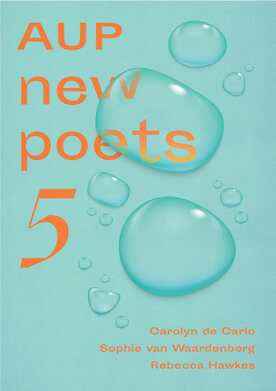
Carolyn de Carlo, Sophie van Waardenberg, Rebecca Hawkes
Edited by Anna Jackson
We’re all happy to see the resurrection of the AUP New Poets series, and long may it continue.
The new format is especially welcome: the older volumes looked a bit more elegant to me, but the new look under Anna Jackson’s guidance allows for more poems. Each of the three authors has the equivalent of a good chapbook, and it is a credit to Jackson that the three voices play so well off each other. We have a nature poet, a journalist-poet, and an introspective poet, each of them eloquent and aware of today’s fast-changing world, all careful observers but with very different priorities.
Carolyn DeCarlo’s first poem, ‘Spy Valley’, describes light and colour as primary sense, seen against a background of silence:
Mauve colours the sky over Spy Valley,
churning a hazy film that deadens bones,
holds things still and seep in its grip.
Nothing moves, all is quiet,
captive in the lush grey wash
tingeing all the houses and fences
and faces upturned to the sky. (p3)
The poet is on a different plane to the upturned faces, and other poems continue the image of the poet looking at the world from a different perspective. ‘Winter Swimmers’ is a series of six poems placed separately through DeCarlo’s selection. It looks like a framework for the other poems; the first with this title begins with the poet floating on the surface:
We drift on the surface,
obeying the currents, ...
They have been before us,
the winter swimmers, ...
Our feet brush against their hair
as we kick on,
bending backward to flip
over and over, never tiring. (p8)
In the next ‘Winter Swimmers’ (p 17) the poet is airborne, distant and bigger, telling us to ‘Watch the birds/diving down into their ears, the ascent just as abrupt’. The third poem finds us in a house watching new ferns grow, ‘the old brown lengths hovering/ then sinking below.’ (p22). The sense of sinking continues until ‘We are in pieces,/ not limited by bodies/ of water and skin,’ (p28) and ‘we float up/ like plastic bags on the sea’. And in the final poem (p35), ‘this is when I think of trilobites’ inhabiting both the Cambrian seas and the present, the geological landscape being in two places at once, and releasing the poet’s imagination as ‘I lie on my own elaborate spine/ chanting for horseshoe crabs/ to grow horns’ (p35).
Sophie van Waardenberg is less introspective, bringing a journalist’s detail to her poems, as well as a strong sense of her personality and her relations with other people. ‘I don’t remember inviting you’ (p35) is conversational and with wonderful images:
go away, well well away, take yourself through my doors
and back into the sun. my body has had its funding cut
and is making you redundant. be offended, or don’t. fly
to france, to california. tell me about it abstractly. wonder
at your luck. my body has a space inside it.
a big space inside it. there it is clean and loud. soon
it will be full of pigeons like piazza san marco.
nobody will be taking any pictures but you.
‘Schön’ (p47) is a (possibly) straightforward love poem, lyrical and exuberant, ending:
my girl lets the spring in through her hands
she puts her hands over my ears and I remember how it feels
it is nice and nice and nice
Rebecca Hawke is in the front line of close-up environmental warfare, in her language and her sentiments. She plays with the visual structure of her poems, which reinforces her whatever-it-takes line of attack. She begins with ‘Primal scream practice’ (p65):
This is the beginning of language A planet
huge and awful throwing itself at the nearest star
and missing Water gnawing toothlessly at the land
‘Add penetrant to preferred broadleaf herbicide & devastate the
wildflowers’ centres on lupins, the plant kingdom’s answer to rabbits –
pretty colours which are just as desirable as fluffy bunnies. (Not.)
‘If I could breed your cultivar I’d have you in my garden’ (p83) begins:
I gripped your hand white-knuckled
as we scuffed through beefy snowdrifts –
dead magnolia blossom
heaped on the pavement & going so greasy
underfoot you slipped. ...
and ends
‘retchworthy but I kind of wanted it.’ ...
Another slimy petal
windblown & useless. I preferred you
quiet as a magnolia cutting, propped
in a jar & dreaming up the tree you could be.
‘Death by nectar’ is a glorious soliloquy by a pitcher plant (p91), reminding us that the animal kingdom doesn’t have a monopoly on troublemakers. Its last stanza:
Oh no
I must close the lid on my crawling
body restless for this honeytrap gullet
these speckles of red and green shrieking
stop and go at the same time
as I surrender to syrup I
must pray the pitcher
withers on its stalk
before I
disintegrate
entirely
The AUP new poets series is well worth collecting and supporting. If they are all as good as volume 5, I’m looking forward to more in the series – go AUP, and well done with this one.
Title: AUP New Poets 5
Authors: Carolyn de Carlo, Sophie van Waardenberg, Rebecca Hawkes. Edited by Anna Jackson
Publisher: Auckland University Press
ISBN: 9781869409036
RRP: $29.99
Available: bookshops

 RSS Feed
RSS Feed
